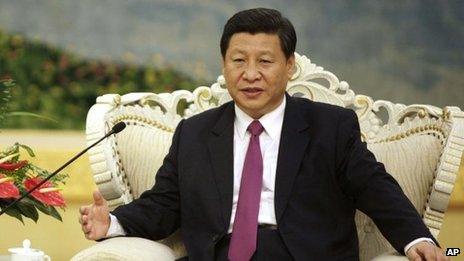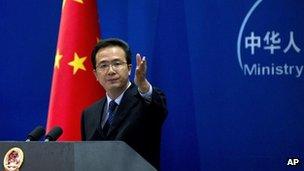Where is Xi Jinping?
- Published
- comments

Nobody knows for certain why Mr Xi has been cancelling his meetings
China is the world's second biggest economy, its rising superpower, and is on the cusp of a once-in-a-decade leadership change, but the man expected to take over at the head of the Communist Party has vanished from view, and we don't know why.
Is Xi Jinping sick? Has he had a mild heart attack? Did he hurt his back playing football or swimming? Is he extraordinarily busy preparing for the day, probably next month, when he will be elevated to take over from Hu Jintao as the head of China's Communist Party, or is there some more sinister power struggle happening?
All have been suggested as explanations on China's buzzing social media sites.
It has even been claimed he was injured in a car crash, which was maybe a plot against him. But that seems fanciful.
However, nobody knows for certain because China's government is not saying, and that in itself is unsettling many.
When Communist party figures disappear from view it sometimes sends a signal that they are in trouble. There is no evidence that is the case now but, without a simple explanation, rumours have been swirling and they have broken into the open.
China's leaders often keep a low profile. Their movements are rarely announced in advance, and they may be out of sight for days at a time.
But Mr Xi, China's vice-president and the heir apparent, who is 59, has been cancelling meetings with visiting foreign leaders, which is unusual.
He was last seen on 1 September. He cancelled a meeting with Hillary Clinton at the last minute last Wednesday. American officials said they understood a back problem was the reason.
Danish sources said the next day, on Thursday, he cancelled again, this time on the visiting Danish Prime Minister Helle Thorning-Schmidt, who was due to meet him on Monday.
They couldn't say why. But Mr Xi has also cancelled on Singapore's Prime Minister Lee Hsien Loong. China's leaders are usually sticklers for protocol, so calling off these events is highly unusual.
According to the Reuters news agency, external "a source close to the Beijing leadership" said that "Xi injured his back when he went for a daily swim... the source declined to give further details on the injury, including exactly when and where the incident took place."
A second source, "citing people close to Xi, told Reuters 'He's unwell, but it's not a big problem.'"
'Nothing to add'

China's foreign ministry spokesman, Hong Lei, says he had 'nothing new to add'
But given China's new status, its new weight as an economic and political power, such uncertainty is a problem. And if Mr Xi is about to take over as China's leader for the next 10 years his health is an issue that is significant for the Communist Party, for China and for the rest of the world.
China has undergone an extraordinary transformation in the past decade under Hu Jintao. But what has not changed is the secrecy surrounding its leaders. Their health, their personal lives, their families and much more are often hidden from view and that is increasingly difficult to sustain.
China's Foreign Ministry was unable to say where Mr Xi is or why he had been a no-show at so many events.
Asked repeatedly for an explanation, the Foreign Ministry spokesman Hong Lei said "I have already answered reporters' questions on this many times. I have nothing new to add."
What the whole affair has added is a fresh twist of uncertainty to China's coming leadership change. The handover has already been complicated by the scandal over the fall of Bo Xilai, who was tipped for a top post.
In China, where the Communist Party stage-manages its once in a decade leadership shuffle, ensuring a smooth succession is of the utmost importance.
Until Mr Xi appears again in public, the uncertainty won't abate.
But in a nation that is now a vital part of the global economy, integrated into global diplomacy, and whose citizens are wired up to the internet, the old-style secrecy surrounding the Communist Party and its leaders looks increasingly untenable.